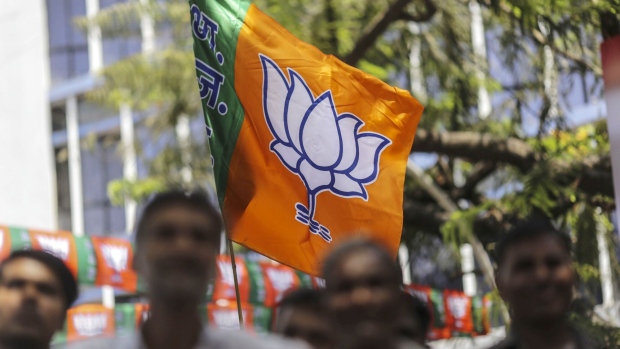Feb 15, 2024
India’s Supreme Court Bans Political Funding Via Electoral Bonds
, Bloomberg News

(Bloomberg) -- India’s Supreme Court struck down an opaque political funding tool spearheaded by Prime Minister Narendra Modi’s government, a surprise decision just months before an election.
In a unanimous ruling, the five-judge bench ruled Thursday that electoral bonds, which allows for companies and individuals to make anonymous donations to political parties, were unconstitutional. Voters had the right to information that’s necessary for them to case their vote, according to the decision announced by Chief Justice D. Y. Chandrachud.
The Bharatiya Janata Party-led government introduced the electoral bonds in 2018 as a way to cut out black money and channel funds through the banking system instead. The BJP was the main beneficiary of the funds in the five fiscal years through 2022, according to an analysis by Association for Democratic Reforms, which first challenged the funding tool in court.
“In the last decade, we have seen the court give much greater leeway to the government’s laws except those which directly impinged on the court’s powers,” said Alok Prasanna Kumar, co-founder and team lead, Vidhi Centre for Legal Policy. “So it was a surprise to see the court go completely against the entire grain of the government’s arguments.”
The bonds aren’t promissory notes traded in global markets. Instead, they can be bought by any individual or company from the government-owned State Bank of India in denominations from 1,000 rupees to 10 million rupees ($120,470). The donor’s name isn’t attached to the paper, which is then delivered to a political party to exchange for cash.
The Association for Democratic Reforms had argued that citizens had the right to know the source of political funding, while the government said donors had a right to privacy.
The Supreme Court directed State Bank of India on Thursday to stop issuing so-called electoral bonds and to provide all the details of contributions made through them to the nation’s election panel by March 6, which must then publish the information on its website.
Election Funding
Despite the ruling, analysts said it may not damage the BJP’s chances so close to the election. The court had been deliberating on the case for close to six years already.
“It is too late now as the ruling party may already have taken advantage of the bonds,” said Yogendra Yadav, a political activist and founding member of political party Swaraj Abhiyan. “Opposition parties were anyway not getting much donation through these bonds.”
The BJP earned nearly 52.7 billion rupees through electoral bonds in the five fiscal years through 2022, accounting for about 57% of the 92 billion rupees raised through these bonds, according to a report by the Association for Democratic Reforms, based on data from India’s Election Commission. The share of the main opposition party, Indian National Congress, was 10%.
The Congress party said in a statement Thursday it welcomed the decision, describing the electoral bonds as a “black money recycling scheme.” BJP spokesperson Nalin Kohli, speaking to reporters in Delhi, said “any order of the Supreme Court has to be respected.”
Niranjan Sahoo, a senior fellow with Delhi-based Observer Research Foundation, said that while the ruling was a setback for the BJP, it won’t have an impact on the elections.
The BJP is a “moneyed party and it has deep pockets and collects its funding from multiple sources,” he said.
India’s 2019 election, which brought Modi to power for a second term, was among the world’s most expensive, costing about $7 billion, according to New Delhi’s Centre for Media Studies.
Trilochan Sastry, chairman of the association, said the ruling was a “great shot in the arm for Indian democracy.”
“I hope we have more transparent and cleaner elections than in the past but it is too early to say because there are only two-three months left,” he said.
--With assistance from Shruti Srivastava.
(Updates with additional details and comments)
©2024 Bloomberg L.P.








